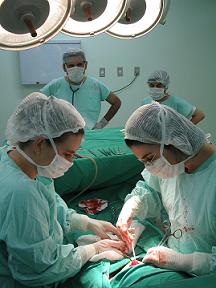The time required to train a competent surgeon is a hotly debated topic as working hours for medical trainees are increasingly restricted worldwide. Surgical disciplines are unique in that surgeons must not only acquire medical knowledge but also develop the manual dexterity and, sometimes, the strength and endurance to perform procedures. We examine the evidence from the United States on the effects of duty hour legislation on surgeons’ training.
Regulations on working hours
Not all countries regulate working hours, but in those that do, the maximum hours per week for a doctor in training can range from as little as 37 hours in Denmark to 80 hours in the United States. The European Working Time Directive decreased the weekly hours for trainees to 48 in August 2009.
In the United States, the Accreditation Council for Graduate Medical Education (ACGME) imposed a national limit of 80 hours weekly for all medical trainees in 2003. The Institute of Medicine has just called for greater restrictions, suggesting a five hour “nap” between 10 pm and 8 am for extended shifts and more time off after working periods – from 10 hours after a day shift to 48 hours after three nights of consecutive duty.
Sleep researchers applaud these efforts. Heavy night call, defined as every fourth or fifth night, has been shown to compromise attention and vigilance as much as alcohol intoxication, and sleep deprived surgeons have exhibited impaired psychomotor performance with laparoscopic simulators. As ludicrous as taking a nap while on call may seem, late evening and early morning hours are associated with low temperature and cortisol levels and, in turn, low arousal states, which can affect performance.
Five years after the introduction of the 80 hour week in the US, Myriam Curet reviewed the effects of the restrictions on surgical trainees and quality of care. The hour restrictions seem to have produced measurably happier medical trainees with better quality of life, but they may also have compromised the surgeon’s educational experience.
How long does it take to become an expert?
Educational psychologists have shown that acquiring an elite level of expertise or performance requires about 10 years of intense involvement and 10,000 hours of practice. Critical to the development of expertise is deliberate practice, which consists of focused activities to improve some aspect of performance with the ability to receive feedback. Ericsson and colleagues showed these principles hold true across a wide variety of domains—from music and chess to athletics and science.
Although we all enjoy stories about gifted prodigies who rapidly master a skill, these instances are rare. Most unusually successful individuals have benefited from some type of early and intense exposure. Microsoft’s Bill Gates spent thousands of hours programming before completing high school, for example.
There probably isn’t a shortcut for learning surgery, especially with the need for both cognitive abilities and manual dexterity. The elite surgical training program of renowned educator David Sabiston was affectionately known as the “decade with Dave” because he often required that nearly 10 years be spent in clinical training and research.
Surgical residencies striving to turn out competent surgeons may not need to provide a decade of training, but Ericsson’s work provides compelling evidence that the absolute number of hours and how they are spent do matter.
Consequences of restricting work hours
Do restricted working hours provide enough time to train a competent surgeon? In the United States, general surgery training programs require five years of clinical training with additional years of fellowship for subspecialty certification. Many programs also encourage several years of research, during which trainees are expected to participate in didactic sessions.
If a program has two weeks for holiday (that is, 50 weeks a year of work) an 80 hour week allows 4000 hours a year or 20,000 hours over five years. A 37 hour week offers 1850 hours a year, and a 48 hour week has 2400 hours. Most programs have longer holidays and thus fewer hours for training.
An analysis of operative logs from US surgical graduates before the restrictions on working hours estimated that residents spent an average of 2753 hours operating as the primary surgeon, 272 hours serving as an assistant, and 938 hours providing immediate preoperative and postoperative care over five years.
This 3963 hour total constitutes about 20% of the working time in a typical American surgical residency and could probably be accommodated even by programs in countries with the most restrictive hours.
However, the time spent operating is only a small, albeit critical, component of surgical education. Trainees must also learn to decide who needs an operation, study the relevant anatomy and variations in operative technique, and become skilled at routine and complicated postoperative care.
The challenge of work time legislation might not be the absolute number of hours but whether a surgical trainee can assimilate the necessary clinical experiences. Deliberate practice with direct feedback is essential for developing expertise. Few surgical experiences provide more instructive feedback than returning a patient to the operating theatre after a complication.
One study on an emergency operative service showed that senior residents participated in 60% of these “take back” cases in the two years before the introduction of the 80 hour week but only 29% afterwards.
Disquieting trends in the quantity and quality of residents’ operative experience have been observed since working hours were limited. Research can be found to support increases, decreases, and no change to the number of operative cases. However, many studies that show improvements or no change looked at senior residents, who may be taking the cases from junior trainees, and opportunities to assist and to teach are often lost.
For example, one study of operative volumes in the two years before and after the introduction of the 80 hour work week showed a significant decrease in total operative cases and primary surgeon cases for residents in training years 1, 2, and 4.
Although chief resident (year 5) operative volume was unaffected, first year residents had an 85% decrease in first assistant cases (from an average 53 cases to 8 a year), and chief residents had a 78% reduction in the teaching assistant role (from 23 to 5).
In addition, some researchers have shown worrisome changes in the nature of the surgical experiences. One study of emergency abdominal procedures recorded no overall change in total numbers of cases but found a 40% reduction in technically advanced procedures (from 51 to 31 per resident) with a compensatory 44% increase in basic procedures (47 to 84) done by fourth and fifth year residents.
This study also showed a 34% decrease in first assistant experience (from 88 to 58 cases per resident) and a 42% reduction in teaching assistant cases (53 to 31). It is unclear whether these changes in procedural experience affect the competence of a surgeon at the completion of training. Several studies have showed improvements on the American Board of Surgery in-service training examination since institution of duty hour restrictions, but higher scores on standardised tests do not always translate to better clinical performance.
One of the primary goals of restricting hours was to enhance patient safety. Studies of such effects in surgery are limited, but many show alarming negative trends. At one level I trauma centre, both preventable and non-preventable complication rates significantly increased and missed injuries doubled after adoption of the 80 hour working week.
Poulose and colleagues found an increase in unintentional punctures and postoperative thromboembolic events after enforcement of working hour restrictions in New York teaching hospitals, but no such changes in these event rates in New York non-teaching hospitals and Californian teaching hospitals that had not yet adopted the restrictions.
German working time regulations reduced daily shifts from 12 to 8 hours in 1996, and a subsequent study of surgical intensive care unit patients showed increases in complication rates, re-interventions, readmissions, and length of stay in intensive care units and in the hospital.
Strict legislation poses challenges not only for education, but also for staffing—doctors must be found for the uncovered shifts. It is difficult to know whether the observed effects on quality of care or health outcomes reflect changes in trainee competence or the addition of part time moonlighters to the care team.
In the United States, many places have filled clinical shifts by allowing trainees doing additional years of research to serve as moonlighters. This practice, which was commonly prohibited in the past, effectively extends clinical training.
Evidence also suggests that duty hour regulations create ethical dilemmas for trainees, who get caught between attending surgeons wanting the work done properly and program directors charged with adhering to the rules. One survey of residents from medical, surgical, and paediatric specialties showed that most residents exceeded their working hours, usually because of concerns about patient care, and nearly half admitted to lying about their hours.
When a complicated patient requires attention at the end of a shift, a resident may be confronted with the “unethical” choices of lying about hours, transferring care to a colleague who knows little or nothing about the patient, or being truthful and putting their training program’s accreditation at risk.
Flexible approach
Defining exactly how long it takes to train a surgeon may be impossible, but we estimate that about 15,000 to 20,000 hours are required. If elite expertise is attained after about 10,000 hours of practice, surgeons must train for twice this time to master both cognitive and manual skills.
This “doubling” of time in training would hold true for any interventional specialty for which the practitioner must show manual skills as well as knowledge and judgment. We would not expect trainees to achieve mastery during their residency, so 20,000 hours may be an overestimate. However, most patients probably want independently practising surgeons to reach a level of skill that is well beyond adequacy.
Rare diagnoses, complex cases, and complications providing vital educational lessons cannot be scheduled. Advanced technical procedures such as tumour resections with vascular reconstructions or the separation of conjoined twins cannot be condensed into limited shifts.
Requirements must be designed to ensure that trainees have meaningful experiences with the challenging and unusual cases along with sufficient repetition of the routine.
Flexibility is crucial. Regulations must permit exceptions to weekly hours or shift lengths when unique and instructive educational opportunities arise. Working restrictions should allow enough time for residents to be exposed to an adequate breadth of cases, not just as senior residents, but throughout their training.
Continuity of care is a critical part of training, as new practitioners must understand the natural course of a disease, learn the signs of complications, and experience the consequences of their decisions. Schedules cannot be so restrictive that they allow trainees only brief glimpses into the clinical course of a patient.
Although simulators can provide practice and improve technical skills, simulation is no substitute for participating in the operative care of actual patients. As quoted in Forgive and Remember, a classic sociological analysis of surgical practice, “Surgery is a body-contact sport, there is no question about it. You can’t be a good armchair surgeon.”
The US rules permit 80 hours a week on average over four weeks (that is, 320 hours over 28 days), and we recommend flexibility, discretion, and common sense for regulations of shift lengths and periods of rest. If enough hands-on patient care as well as operative experience cannot be achieved during a restricted working week, surgical training should be extended, perhaps with incremental accreditation so that earlier independence for minor procedures offsets a longer period of instruction.
Some argue that the proliferation of fellowship training already tackles inadequate experience. Ironically, patient safety, a driving force for reduced working hours has not improved with the introduction of restrictions. Patient care and physician integrity are the founding principles of surgical training; regulations on duty hours must not be constructed in a way that compromises them.
Contributors and sources: GPJ has developed innovative internet based and handheld electronic medical information resources and was an information architect for Unbound Medicine, a knowledge management company that delivers electronic medical educational resources. JLT is director of the general surgery training program at the Vanderbilt University Medical Center and was president of the Association of Program Directors in Surgery for 2007-8.
BMJ 2009;339:b4260
Do the work hours of trainees have a strong affect on the level of training that apprentice doctors receive? Share your thoughts on medical education using the form below:






